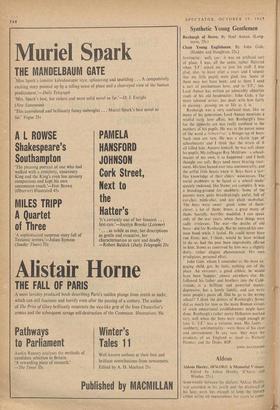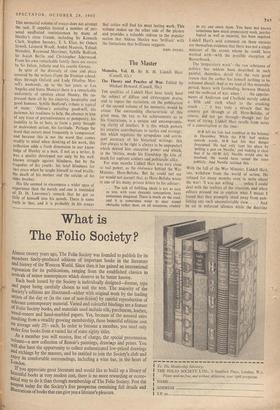Aldous
SomEwi14a. between the idolatry Aldous Huxley was accorded in his youth and the dismissal of his later work lies enough to keep the literary critics active on reassessment for years to come.
This memorial volume of essays does not attempt the task. It supplies instead a number of per-
• sonal unaffected reminiscences by many of Huxley's close friends, including Sir Kenneth Clark, Stephen Spender, T. S. Eliot, Sir Osbert Sitwell, Leonard Woolf, Andre Maurois, Yehudi Menuhin, Raymond Mortimer, Sybille Bedford, Sir Isaiah, Berlin and Christopher Isherwood.
o From his own remarkable family there are essays by Sir Julian, Juliette and his cousin Gervas.
In spite of the diversity of time and place covered by the writers (from the Etonian school- days through Oxford and Lady Ottoline Mor- rell's weekends, up to the last years at Los Angeles and Santa Monica) there is a remarkable uniformity of opinion about Huxley. He im- pressed them all by his sincerity, hospitality and good humour. Sybille Bedford's tribute is typical of many : 'Aldous's unfailing good-will, his patience, his readiness to help, the absence in him of any trace of pretentiousness or pomposity, his inability to lie or hate, to form a petty thought or malevolent action; his fortitude.' Perhaps the word that occurs most frequently is `compassion' and because this is not the word that comes readily to mind when thinking of his work, this collection adds a fresh dimension to our know- ledge of Huxley as a man, if not as a writer. It was a quality developed not only by his well- known struggle against blindness, but by the tragedies of his youth: his total blindness for two years when he taught himself to read braille; the death of his mother and the suicide of his elder brother.
His life seemed to encompass a wider span of experience than the novels and one is reminded of D. H. Lawrence's remark that be got so little of himself into his novels. There is some truth in that, and it is probably in his essays that critics will find his most lasting work. This volume makes up the other side of the picture and provides a valuable redress to the popular notion that Aldous Huxley was `brilliant' with the limitations that brilliance suggests.
JOHN DANIEL







































 Previous page
Previous page